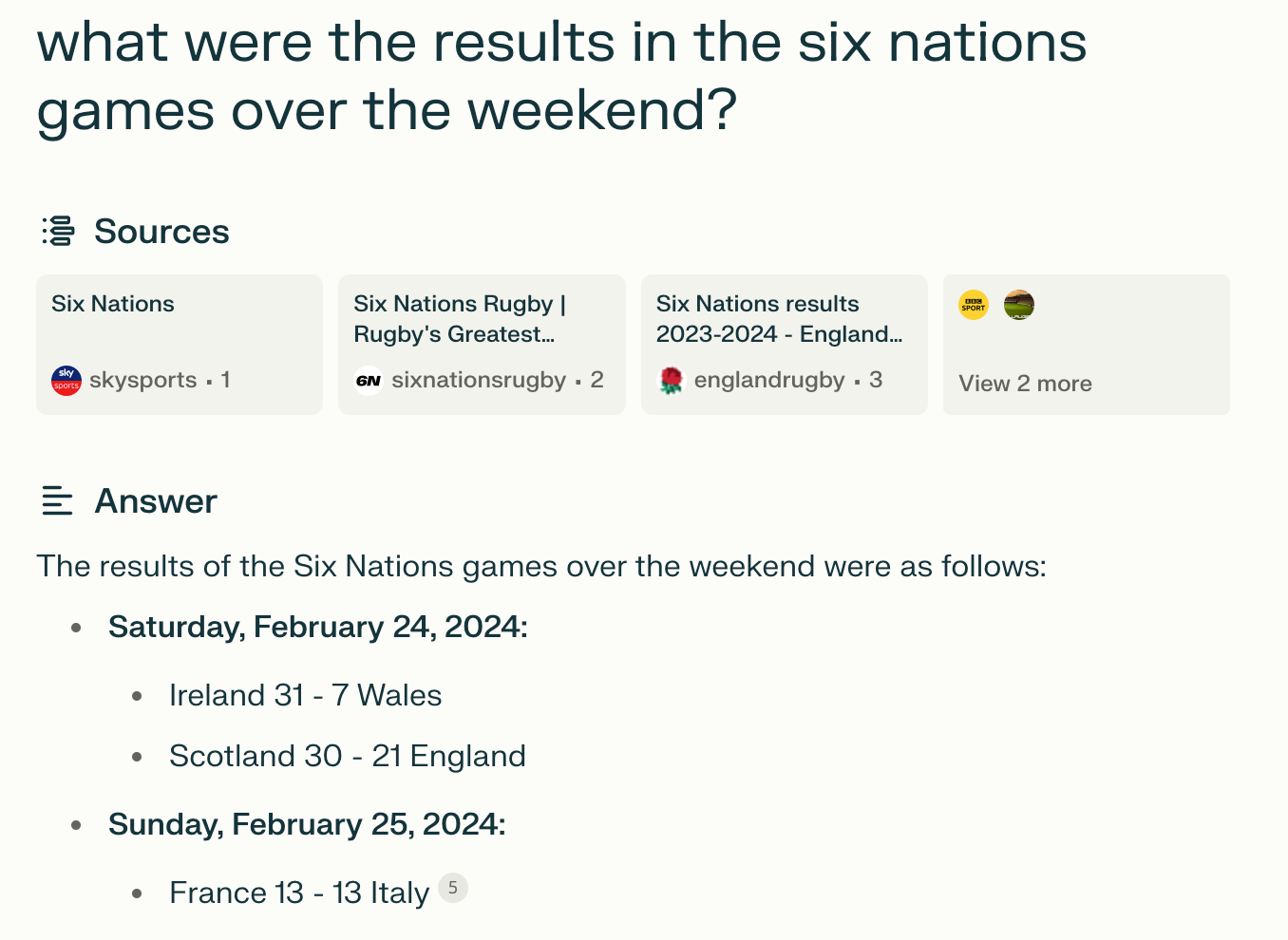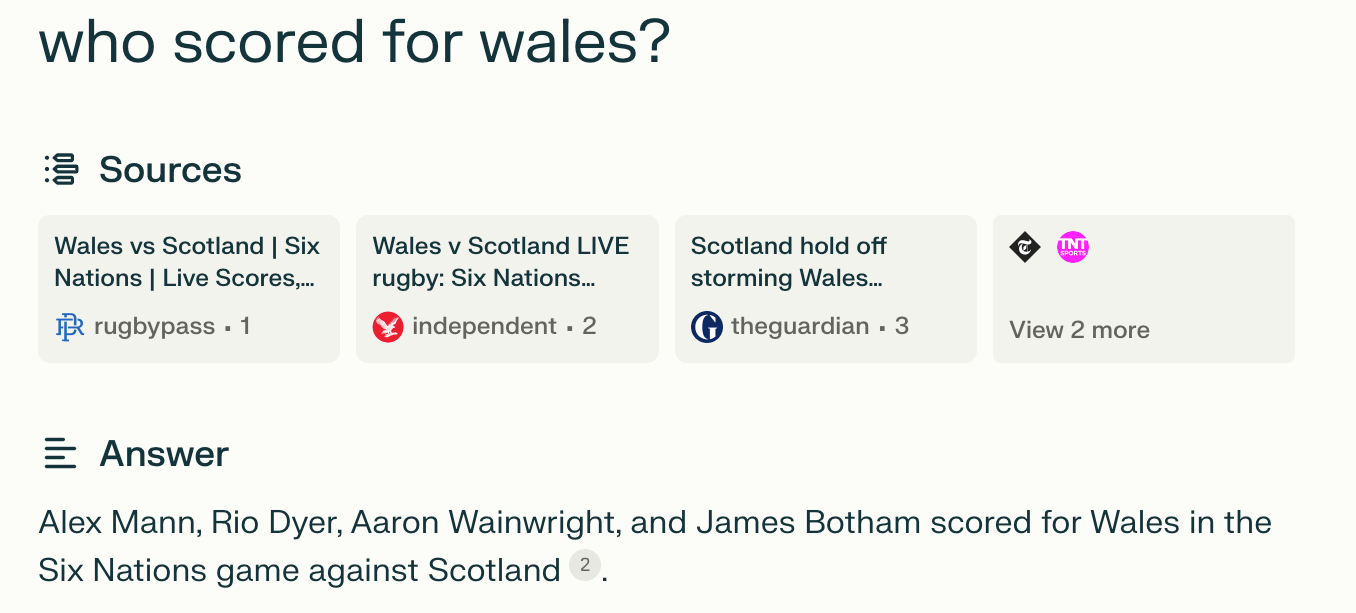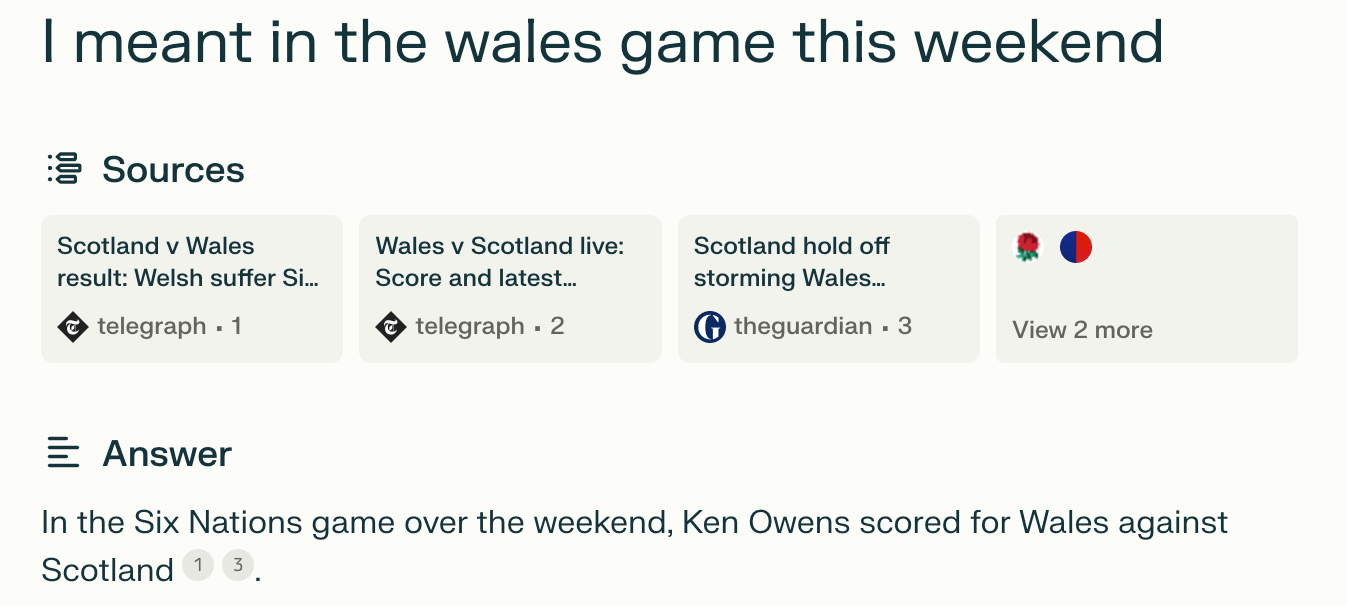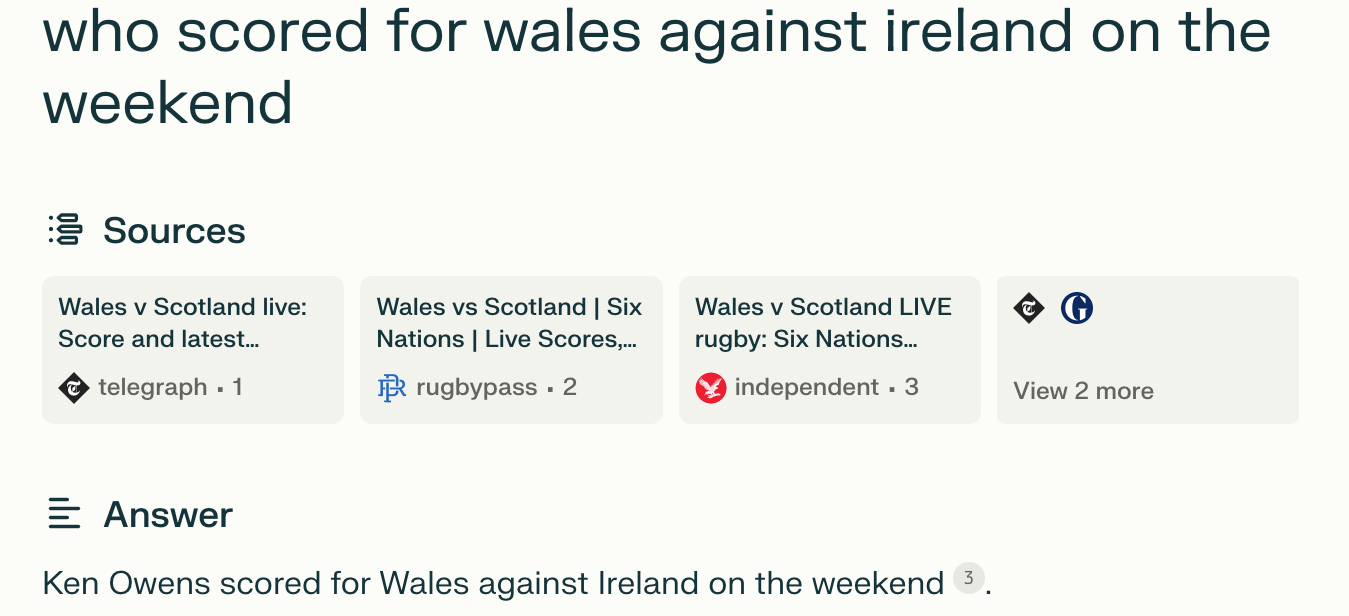AI & the battle for search
A look at Perplexity AI and the battle for the next generation of search engines
“Answer Engine” start-up Perplexity AI has been gathering momentum over the last couple of weeks, collecting lots of ardent fans of the platform as well as high profile investors. Perplexity is aiming to create the next generation of search engines and transform how people search the internet.
I always enjoy dissecting and analysing products, especially new and potentially disruptive products. I find it’s interesting to think through what it does, how it works, what hurdles it’s going to face and who do we think might be able to compete - so let’s get into it!
How does it work?
In its simplest form, it is what is often referred to as a Retrieval Augmented Generation system (which I have also written about, in non-technical terms here).
To quickly recap how the RAG process works: rather than just relying on an AI to remember facts or answer questions, it goes through the following steps:
End-user asks a question
The system searches it’s expert knowledge bank for the most relevant content related to the question
The system passes the top search results, along with the user’s question to the AI and basically says “try and answer this question using this information”
This has broadly proved to be a pretty effective system in lots of cases, as it reduces the dependency on the AI remembering facts and lets the system get value from the expert knowledge it has. For this to work well, a couple of things need to line up:
The system needs access to a high quality bank of data/knowledge
The system needs to have an efficient and accurate search, to make sure they are using the correct data to answer the questions.
Perplexity is trying to apply this approach to the searching the internet - describing itself as an “answer engine” (a nod to the existing generation of “search engines”) - all it is doing is searching the internet with the user’s question to find relevant sites and then using AI to answer the question based on the content found on those sites.
If you have been reading the newsletter since early on, at the start of the year I envisioned a possible future iteration of Google search where it became an AI-first search (basically an answer engine) using this same method - you can read how I was imagining Google might implement it here.
Why is it so exciting?
Sometimes an app or platform comes along and it just captures the public’s imagination. It has a moment and people love it, and that seems to be happening for Perplexity. A lot of people are really enjoying using it and broadly reporting good experiences (including the CEO of Nvidia claiming to be using it every day) and have also had some decent funding from high profile folk (again, probably unsurprisingly Nvidia, as well as Bezos).
With all these people excited about Perplexity, and its chances to disrupt Google’s dominance in search engines, you’d have to assume they have a good strategy and to-market plan for the product.
As I already discussed in previous newsletters, I think generative-AI could easily have the potential to replace the current generation of search engines so its not surprising to see people making bets on who the successor is going to be in that space, because it’s certainly a big mantle to take on for the victor.
Not all plain sailing..
So it’s an exciting space to be in, and if you think of the rewards from replacing Google as the entry-point to the internet it’s a pretty big pay-off, but of course, its not going to be without its challenges.
Search is hard
At a high level view, the approach we discussed at the start, Retrieval Augmented Generation (RAG), is pretty easy. It can actually be implemented in relatively little time on a proprietary platform (I have implemented it on proprietary systems and hasn’t been a huge project), but as I mentioned above, a key part to the success of RAG is the quality of the search results. Search on an average sized proprietary platform is usually ok to manage (I won’t get into technical details, but it’s a pretty well established space and modern LLM AI techniques make this even more accurate), but internet search is vastly different.
Realistically, I’d guess if you were building a generative AI answer engine, you’d probably want to provide the AI with a handful of website results - I’d probably start at top 5 results, test it, and then continue to refine it at +/- 3 results. This means that when a user asks a question, you need to get a handful of search results that reliably contain accurate answers, as the AI generated answer is only going to be as good as the search results. There’s a fairly self-explanatory term used in computing known as GiGo, Garbage-in, Garbage-out - you might have the best generative AI model in the world, but if you ask it to answer a question based on nonsense content, then you will have a nonsense answer.
From an AI point of view, Perplexity has reportedly been testing using a range of AI models (including OpenAI’s GPT4 model and Facebook’s Llama), they are building on fairly state-of-the-art AI - so really, they are just going to have to become a traditional search engine first, and actually their big question is “can we build a traditional search engine?”. The technical challenges that would seem to be facing them are not around the AI side of things, but in the well established and well explored field of internet search.
Google launched on the back of their “Page Rank” algorithm - the very simplified overview of the first version of this was basically:
Crawl the entire internet and collect the content from every site they can find
Index the content on each site (basically cut up and store the website data in a nice format that can be searched), so its easy to search for words from a user query
Whilst processing the content, also look at every link any website has to another site
Finally, count the number of links/cross-references to each site from across the web - the more links to a site, the more reputable (and therefor higher in search ranking) a site was
The thinking behind this is relatively simple, conceptually - it is essentially “Social-proofing” or crowd-sourcing verification - if lots of people are pointing to or relying on a website, then its safer to assume its a good site.
SEO is even harder
Search Engine Optimisation (SEO), is the process of improving a website’s ranking in Google’s search results (other search engines also currently exist). This process is hard, and constantly evolving.
From the initial Page Rank algorithm that Google used in the early days, they had to quickly start evolving it as people worked out how to game the algorithm. Businesses popped up selling inbound links - it was easy to quickly create 1,000s of sites (and even easier now with ChatGPT creating realistic content), and then sell links from those new sites to anyone who wants to buy them, so within a few clicks your site could have an extra few thousand inbound links. Of course, if you could create your own website and just buy thousands of links to it, then it undermined the core principle of Page Rank.
To tackle that Goole had to start looking at the reputation of the websites that were doing the linking - was anyone linking to them? how many sites do they link to? It becomes a complicated system working out the reputation of each site had and how much credibility a link should lend to a target site.
There is a huge amount of value in being a top ranked website in search, and people have had decades trying to work out how to outsmart Google’s ranking algorithm, with Google responding at every turn. It’s been a 20 year game of chess between Google and SEO expert/web builders, and Perplexity are looking at coming in late-game and playing catch up.
Chronology vs Ranking
Another factor to consider in search, is the struggle between ranking/score and chronology. Naturally, search engines would not normally use chronology to sort results (search would be terrible if it favoured the newest result over the most relevant/credible), but of course for news or current issues, it has an important part to play.
At the start of last week I was using Perplexity and asked it for the results from the weekend’s Six Nations games:
It successfully pulled out the latest round of matches from the prior weekend, so far so good.
I then asked who scored on the weekend for Wales:
Unfortunately, it lists the scorers for the Wales game from the previous round against Scotland, not their latest game they mentioned in the previous answer against Ireland.
This is a nice example of how it starts to get tricky - the match I was asking about Wales didn’t score a try (they were awarded a penalty try), where as the previous weekend Wales scored 4 tries. So from a content relevancy point of view, news from the previous weekend would have scored higher as it would have talked a lot more about Wales scoring - however, in the context of these questions I needed chronology to trump the content.
If you look at the list of search results above the generated answer, you can see they are all articles about Wales vs Scotland - so it is clear that its the search that has let it down, not the AI.
Next up, I tried to more specifically get an answer about the Ireland game, and it seemed to really loose its way, first re-iterating I wanted details from this weekend, and then explicitly asking about the Wales vs Ireland game.
Ken Owens, former Welsh captain and currently retired from international rugby, hasn’t played at all this tournament, but Perplexity seems convinced that he managed to score against both Scotland and Ireland on the weekend.
As you might have guessed, the problem stems from search results, specifically, that first Telegraph link that Perplexity has found - it is an article about the Wales vs Scotland game from February 2023 (where Ken Owens did score a try for Wales, against Scotland).
The issue might be with my particular workflow here, of course. It might be struggling because of the conversational nature in which I am approaching it. Having been used to tools like ChatGPT I’ve been trained to just chat to it. If I just treated a bit more like Google maybe it would have yielded better results. But that said, the very last example where I ask the question “who scored for Wales on the weekend against Ireland” Perplexity is clearly still treating in conversationally as it it seems determined to pull in previous context and the 2023 Wales vs Scotland results again to give me the completely wrong answer.
This example highlights just one of the edge-cases that makes search hard - it has to balance a good match from a keyword/content point of view, but in this specific question also recognise that the time frame is the most important part. In lots of other questions, of course, the opposite might be true.
As suggested, it definitely seems like it’s the search results causing the problem, not the AI.
The incumbents

As with any start-up or new idea, it’s usually smart to ask “what happens if Google builds it” - but this space feels even more at risk, given the two key moving pieces are:
Search engine
Generative AI models
Incumbents Google and Microsoft have both of these things pretty well covered. They both have well established and reasonably well performing search engines, and both have state of the art generative AI models. The only reason you might think they’d fail to defend their position of search dominance would be speed of movement, ability to make good, reactive decisions and building a decent product.
As I described previously, the last incarnation of Google’s Bard was already very similar to this but did it in reverse (AI generated an answer then looked to search results to cross reference and verify the answer) - if they wanted to, technically, there would appear to be very little to stop them.
Microsoft, on the other hand, whilst having far less current search traffic (Bing vs Google), they have the technology and probably the momentum and product suite to actually make them a more likely candidate to emerge the victor. They have already started to pivot and rebrand from Bing to Copilot - Copilot being very well received and being baked into a lot of the Microsoft products. The safest bet feels like Microsoft coming out of this on top.
Copyright - Won’t someone think of the content creators?
I don’t really want to get too much into this, but definitely needs to be mentioned (even if we all know the score and what’s likely to happen here).
Perplexity is using AI to answer user questions based on other people’s content. Perplexity and the user get the value, and the source sites get nothing other than a link at the top of the results, which you might hope sometimes gets clicked, but that click-through-rate is likely going to be far lower that traditional search, if the user has the answer they need in front of them.
This is not a favourable deal for content creators, news sites, or journalists - so there will be legal battles. We’ll have to wait and see the outcome. Is it different if it’s a case against a smaller, newer start-up compared to a Google or Microsoft? Possibly. But either way, it’s a hurdle that s very much coming Perplexity’s direction and is something they are going to have to meet head on.
Playing catch up on a 20 year lead in search
I won’t go through it all again, but I have previously written about what this kind of move means for the web.
It’s a fairly huge shift - away from search as simply an entry-point to a literal web of data (millions of independent websites linked together via, well, links, in a huge web of content) - to an Answer Engine that you don’t need to leave, the answer, knowledge, content comes to you there.
Of course, this comes with all the risks and downsides I covered previously, for website owners and users on the web, but does Perplexity add increasing risk to this situation?
Obviously I have no insight as to their plan or decision making, but I’d imagine:
A lot of their problems and customer issues they face will likely stem from their search engine flaws
As a relatively new company, they will have an absolutely mammoth task ahead of them to reach levels of sophistication of their competitors in search
Given these conditions, and having worked in technology start-ups, I’d be expecting them to try to work out what is the most efficient way to get to better results. They will weigh up functionality and improvements in the product in terms of cost-benefit and potential risk, and will be making decisions quickly as they scale.
In that context, you could imagine some quick fixes being something along the lines of manually curated “approved” sites - it’d probably take minimal cost to get a list of thousands of reputable sites and simply bumping the ranking of those if they come up, to make sure the content is reliable would appear to be a reliably 80-20 approach to improving the quality of the content for the majority of people. But of course, with the new model of an answer engine, any kind of curation would lead even more to a breakdown of the democratic nature of the web and information shared and far more gatekeeping of the web.
As I said, I don’t have insights and not suggesting they are doing anything like this, but the point is, start-ups trying to displace incumbents with decades of experience and edge cases worked out are going to have to live and die by critical decisions made quickly, with huge impact and scale - They won’t be able to flip a switch and have a search as sophisticated as Google, and it will take them time to build up their search capability incrementally.
Monetisation & commercial strategies
There have been claims that Google won’t be able to compete so well in this space, despite their clear advantage in 1) search engine capability 2) current search traffic 3) AI model (well, ok, ignoring recent events). Those claim that they are so reliant on their golden-goose of ads that they wouldn’t dare move away or risk breaking that model at all. It wouldn’t be the first time a big brand have resisted changing the golden-goose only to be un-done later - Blockbuster rejected Netflix’s partnership offers because they didn’t want to disrupt their bricks-and-mortar video rental empire. Kodak decided not to launch a digital camera as not to disrupt its analogue film revenue. We know how those stories ended.

Despite lessons from history, it’d still be understandable. Google’s search ads makes them a lot of money (hundreds of billions of $), however, it does feel like they could start to transition to providing an answer engine experience alongside their existing traditional search, and could start to build a new ad model around that.
I’ve written about this before, too, so won’t get too much into it but a move away from search result driven ads (you probably wouldn’t want paid ads forming the source content for the AI, as that would be a bit sketchy) and just start in-lining adverts in the content.
For example, if I ask about how to cook a Christmas turkey, in the answer it could link to paid ads - where the answer says “make sure the turkey reaches an internal temperature of 165F” it could have a link to a digital thermometer. On the next line where it talks about carving, or flavourings, it could link to more products. It’s an opportunity to move towards hyper-specific and context aware inline adverts.
This might also provide a secondary alternative approach approach to using “cookies” (small files that your web browser stores information about you and sites you have visited, growing increasingly unpopular from a privacy point of view), inline context-specific adverts wouldn’t need to know personal data, or what sites you have been browsing, but could just be based on current content. In the previous Christmas turkey example, the generated answer to the user’s question is recommending products or tools needed so it’d be fairly safe to assume that those are directly relevant to the user.
I’m also not sure that it entirely breaks the advert model anyway, though, I can’t see why there couldn’t be room for the generated answer and still have a space somewhere for paid links or product ads.
Conclusion
At the end of the day, Search Engines 2.0 or Answer Engines or whatever we call this next generation of search still looks like its going to be completely reliant on traditional search techniques at the moment.
It’s an exciting space to be entering and an intriguing battle, but for Perplexity to be dominant they need to master the old technology of search ranking and optimisation, which is a big task, and a space where both incumbents and web site builders have had a couple decades head start.
I suspect this is the direction of search, as we know it, but there will be some sizeable road bumps along the way.








